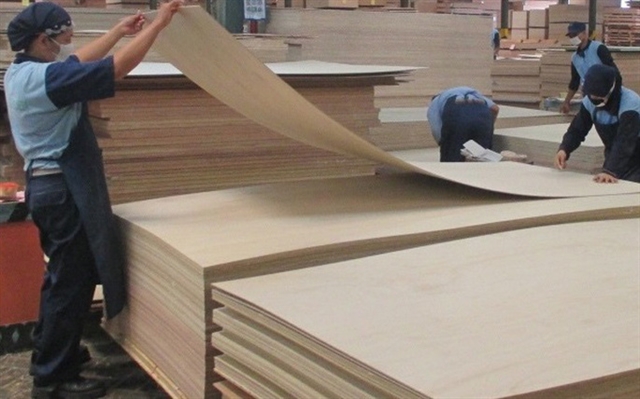Viet Nam's plywood exports are growing despite the impacts of the COVID-19 pandemic according to the Viet Nam Timber and Forest Product Association (VIFORES).

Viet Nam's plywood exports are growing despite the impacts of the COVID-19 pandemic according to the Viet Nam Timber and Forest Product Association (VIFORES).
But exporters face allegations of dumping and evading trade remedies in their two largest markets, South Korea and the US, it warned.
Plywood exports were worth US$800 million last year, accounting for 7 per cent of the country’s total wood and wooden products exports, it said.
The US is the world's largest plywood importer. In 2019 it imported 4.67 million cubic metres for US$2.72 billion.
Its imports from Viet Nam were worth $309 million, while South Korea’s were worth $226 million.
VIFORES chairman Do Xuan Lap said plywood is used in making various interior furniture products, and the global market has seen substantial growth in recent years, creating conditions for Viet Nam to boost exports.
However, the rapid growth in the country’s exports has brought trade defense risks in its two largest markets.
In addition, according to delegates at a conference titled Trade Promotion for Viet Nam’s Plywood and Medium Density Fibreboard: challenges and opportunities in the context of COVID held in HCM City on Monday, an increase in Chinese investment in the sector has caused Viet Nam’s plywood exports to face anti-dumping duties and anti-circumvention in many countries.
The US Department of Commerce had said on June 9 it would examine whether hardwood plywood products completed in Viet Nam using Chinese components are circumventing US duties on imports from China, a move that could see similar duties on Vietnamese imports.
South Korea’s Ministry of Trade, Industry and Energy in April made a preliminary decision to place anti-dumping duties on plywood products from Viet Nam, and requested the Ministry of Economy and Finance to impose anti-dumping duties of 9.18 per cent to 10.65 per cent on plywood imported from Viet Nam.
Ngo Sy Hoai, VIFORES’s deputy chairman and general secretary, said “The threat of anti-dumping lawsuits on plywood products from Viet Nam is increasing, especially in the context of Viet Nam’s timber industry’s increasing integration into the world market.”
The US-China trade war has left many manufacturing companies in Viet Nam facing tax evasion investigations.
“If we fail to prove the origin of plywood exported to the US, Vietnamese plywood may be slapped with anti-circumvention duties equivalent to the tax imposed by the US on plywood exported from China of more than 200 per cent."
This will entail a similar risk for products made from plywood such as kitchen cabinets, he said.
Trinh Xuan Duong, chairman of the Viet Nam Plywood Association, said in the current context businesses need to join hands through associations and the Ministry of Industry and Trade’s Trade Remedies Authority of Vietnam to oppose decisions to initiate investigations by the US and South Korea and prepare sufficient information and data to respond to the investigations.
Le Xuan Quan, chairman of Nano Architecture and Furniture JS Company, said local wood industry business groups should review their members’ export activities to detect any abnormal relationships between their production capacity and export volumes.
If they find any violations related to fraudulent origins, they must widely publicise the case, and authorities need to throw the book at the offenders, he said.
Associations called on their members not to pursue short-term benefits by co-operating with Chinese firms and declare fake origins so that they do not affect the entire industry.
The conference was jointly organised by VIFORES, the USAID and the Trade Remedies Authority of Vietnam — VNS





